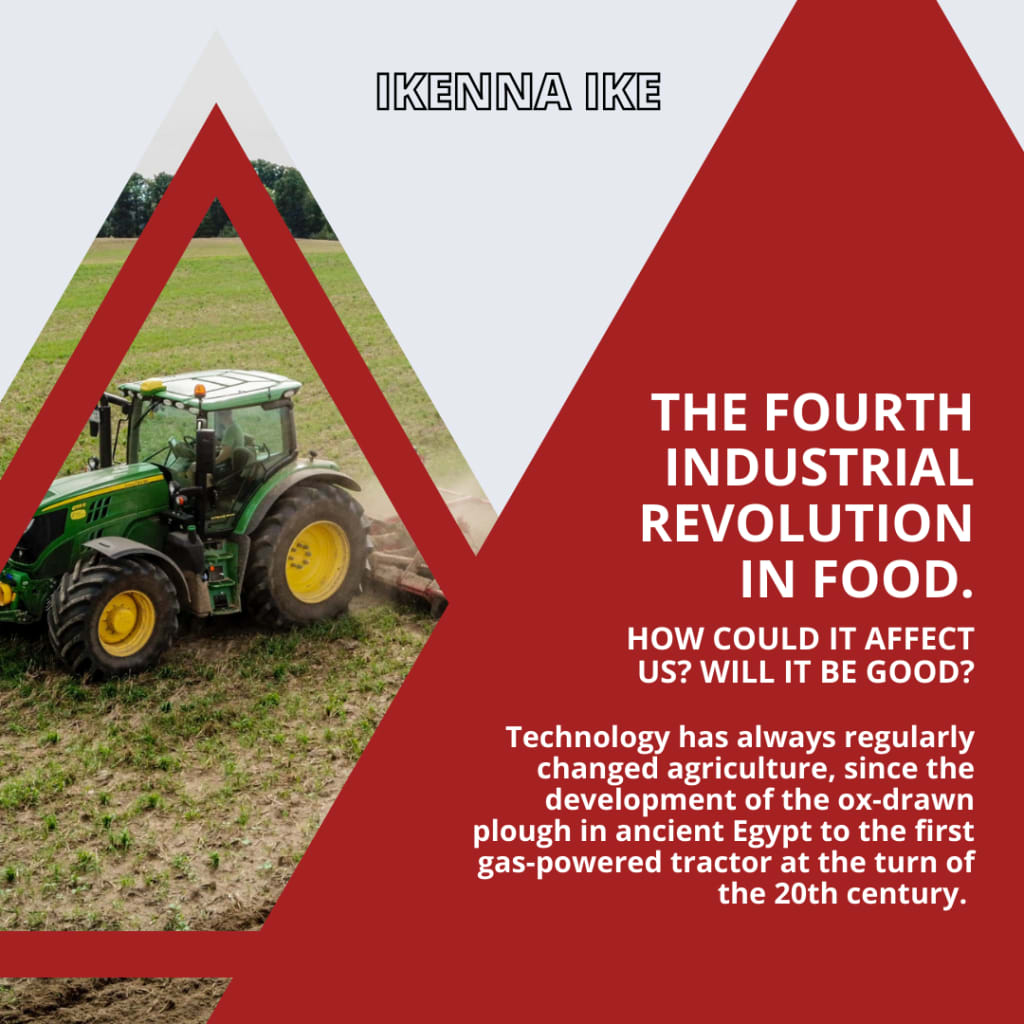Ikenna Ike- The Fourth Industrial Revolution in food.
How could it affect us? Will it be good?

Technology has always regularly changed agriculture, since the development of the ox-drawn plough in ancient Egypt to the first gas-powered tractor at the turn of the 20th century. There was also "The Green Revolution", which introduced chemical fertilizers, insecticides, and high-yielding grain crops in the 1960s.
The Fourth Industrial Revolution won't be different. 2017 already saw the first fully automated crop harvest at a robotic farm in the UK. We could also see autonomous cars planting, fertilizing, and harvesting five tons of barley. It seems like agriculture will once again greatly benefit from technology, and this'll lead to a rather big global market reach in the very near future.
The World Economic Forum and McKinsey & Company indicated that 12 new technology categories were highlighted as having the potential to improve the food system; with alternative proteins and individualized nutrition, the nature of the demand for food could be altered. The connections along the food value chain can also be strengthened by utilizing mobile service delivery, big data, the Internet of Things, and blockchain-enabled traceability. They could develop efficient production systems by utilizing water sensors, genetic modifications, and other advancements that make agriculture more precise and high-yielding.
These technologies could change sectors that are frequently marked by waste and poverty. Though it is not guaranteed that the Fourth Industrial Revolution's technology will automatically bring sustainable development in rural areas, nor that the progress will be immediate. Although the amount of food produced globally increased between 1960 and 2010 as a result of technology and increased trade, this did not always mean better conditions for farmers, consumers, or the environment. Farmers are more frequently caught in a high volume/low price equilibrium, where the productivity increases that lift them out of poverty are partially offset by the lower prices brought on by the greater supply.
Nations like China and Vietnam were able to lift millions of people out of poverty thanks to increased rural land and labor productivity, and still, poverty is mostly a rural issue. According to a 2016 World Bank estimate, 65% of poor working adults are farmers, and almost 80% of the world's extremely poor live in rural areas. This means that some of the most hungry people in the world are those who spend their whole lives cultivating food. Ironic, isn't it?
Globally, 815 million people are still impacted by hunger.
Food production has successfully kept up with population increase, but diet-related illnesses have now overtaken other causes of early death. Almost everywhere in the world, obesity is on the rise. Today, about three billion people's health and future prospects are impacted by subpar diets, which can also be interpreted as almost two thirds of all humans suffering from some sort of unhealthy diet.
One-third of children in South Asia and sub-Saharan Africa are held back by stunting, depriving them of their future potential in a society where cerebral power will progressively outweigh physical strength.
Another major contributor to environmental deterioration is modern agriculture. A recent article in Science magazine says that "Feeding 7.6 billion people with current diets and production practices is degrading terrestrial and aquatic ecosystems, depleting water resources, and driving climate change." Which means… we should really try eating a bit less, or controlling our diet a bit more. 26% of anthropogenic greenhouse gas emissions, 32% of terrestrial acidification, 78% of eutrophication, and 2/3 of freshwater withdrawals come from the food industry. 87% of the ice-free and desert-free terrain on Earth is dedicated specifically to food production.
So, whether or not Fourth Industrial Revolution technologies will increase food production is not the most important issue. Instead, what we really need to be asking ourselves is if this is actually going to help our current issues with food production, and will bring a much more appealing perspective to consumers, producers, and of course, the environment. Farms will most likely not be witness to the greatest advancements. And though farm-level improvements have received a lot of attention, supermarket aisles, the internet, and aggregation apps may also be seeing significant disruption.
Once you notice the complexity of the food system, the changing potential becomes obvious. Just compare the 7.6 billion people who eat our food with the 570 million farms that produce it. It makes sense that data-driven companies like Amazon and Alibaba would enter the food industry because of the roughly 100,000 upstream enterprises that provide farms with things like seeds, fertilizer, finance, and crop insurance, on top of the millions of downstream enterprises that move, process, and sell their outputs.
Technology is only just one aspect of change. Innovations in policy are desperately needed. The extent that agricultural change could reach and the maximizing of its benefits for millions of small scale food producers, food entrepreneurs, and consumers worldwide are at risk.
About the Creator
Ikenna Ike
Hello, I am a fun person and I like to write about various topics that I am passionate about, such as sports such as basketball, American football, and other topics such as music or news.






Comments (1)
Good food! Fantastic ♥️